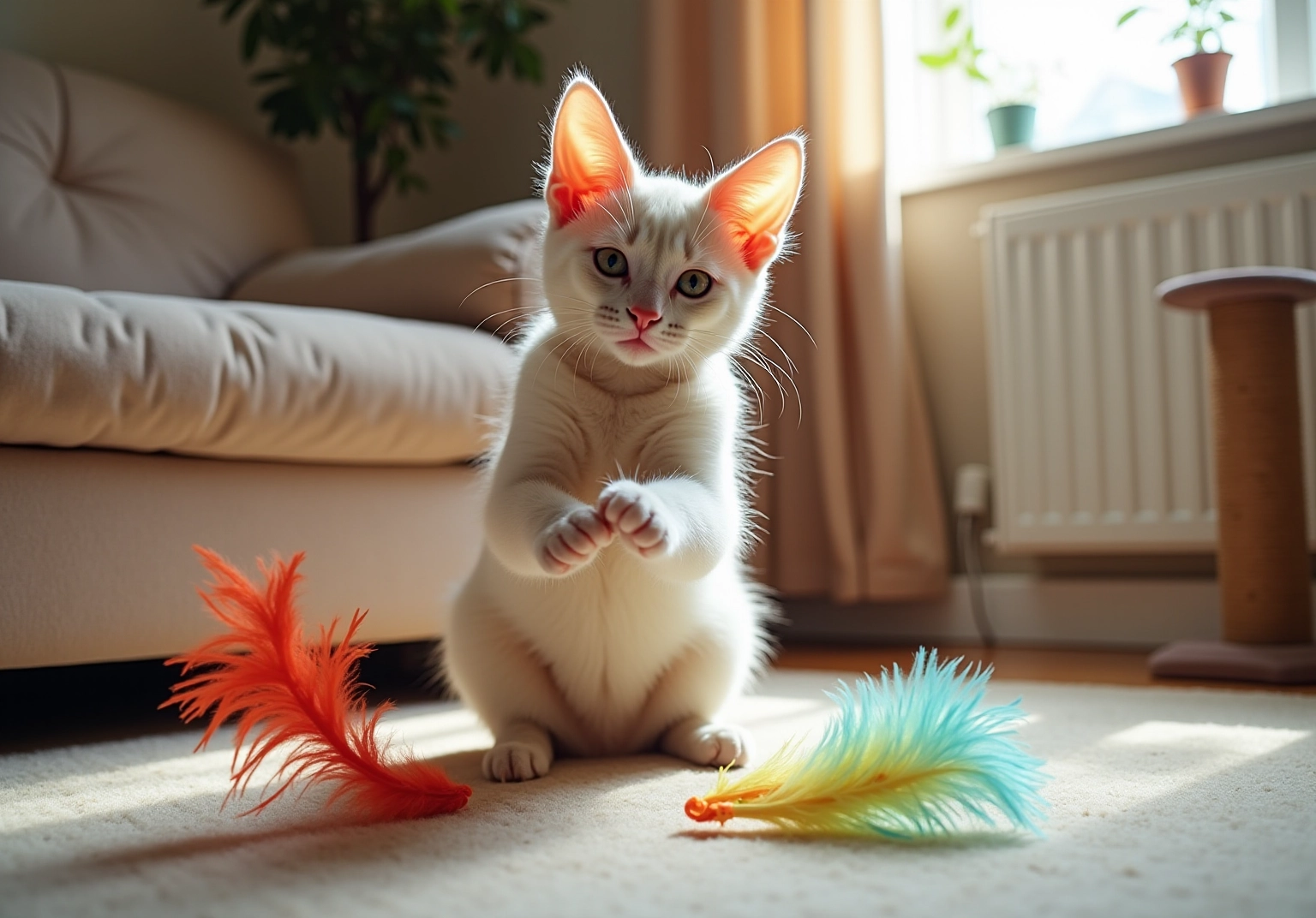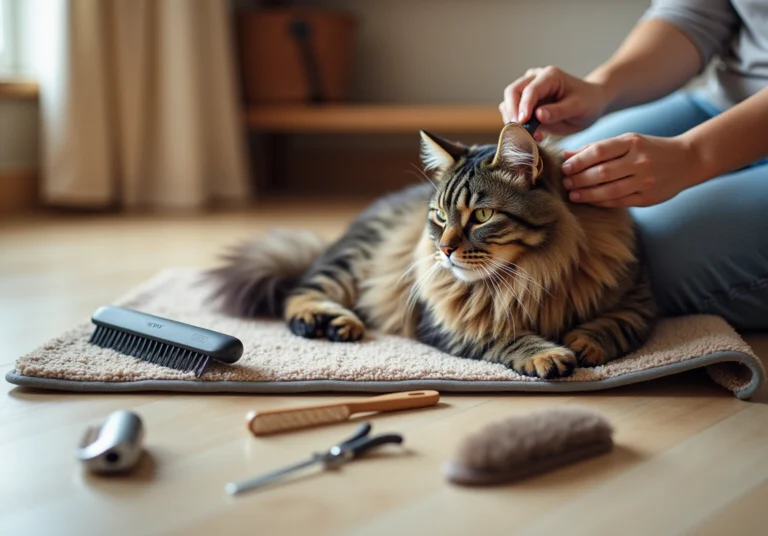Curly Cat Care: Strategies for Health and Positive Behavior
Overview
Caring for your curly cat involves specific strategies that nurture their health and encourage positive behavior. By focusing on grooming, diet, and socialization, you can create a supportive environment for your furry family member.
- Regular grooming is essential to prevent matting.
- A balanced diet promotes skin vitality.
- Early socialization practices are crucial in developing well-adjusted cats, ensuring their overall well-being and happiness.
Embrace these practices to foster a nurturing atmosphere for your beloved pet.
Introduction
Curly cats, like the Cornish Rex and Devon Rex, are not only visually captivating with their soft, wavy fur and prominent ears; they also bring a unique set of care requirements that every loving owner should understand. This article explores essential strategies for ensuring the health and happiness of your furry family members, from tailored grooming techniques to effective behavior management practices.
How can you ensure that your curly companion thrives in both body and spirit amidst these distinctive needs? Together, let’s discover the nurturing environment that will support their well-being.
Explore the Unique Traits of Curly Cats
Wavy felines, known as curly cats like the Cornish Rex and Devon Rex, possess unique physical characteristics that make them truly special. With their soft, wavy fur and prominent ears, these adorable companions not only stand out visually but also have specific grooming needs and temperature regulation considerations. It’s important to understand that these breeds often have less hair than traditional cats, which means they may require more regular grooming to prevent tangling and skin issues.
The Cornish Rex typically weighs between 5-9 pounds, while the Devon Rex ranges from 5-10 pounds, and both breeds enjoy a lifespan of 9-13 years. Their playful and affectionate nature means they thrive on social interaction and mental stimulation, making daily interactive play essential for their happiness and well-being. By recognizing these characteristics, you can create a nurturing environment that meets your furry family members’ specific needs, ensuring they remain healthy and content.
Veterinarians recommend gentle brushing to maintain their lovely curls without causing any damage, and regular baths may be necessary if their coat becomes oily. Additionally, it’s worth noting that curly cats are often considered hypoallergenic, making them an appealing choice for prospective pet owners. Embrace the joy of caring for these unique cats, and you’ll find that understanding their needs leads to a rewarding companionship.

Implement Effective Care Strategies for Curly Cats
Caring for your curly cat is a rewarding journey, and we recognize how much you desire to provide the best for your furry family member. Here are some nurturing strategies to help you along the way:
-
Regular Grooming: Schedule grooming sessions at least once a week to remove loose hair and prevent matting. For long-haired felines, including those with delightful wavy coats, daily or every-other-day grooming is essential to maintain their beautiful fur and reduce tangles. A soft brush designed for wavy fur will make this task easier and more enjoyable.
-
Balanced Diet: Your cat deserves a high-quality diet rich in protein and essential fatty acids to promote skin and coat vitality. Consulting with a veterinarian can help you identify the best food options tailored to your cat’s specific needs. Remember, a balanced diet is crucial for sustaining the overall health of cats with wavy fur, as specialists emphasize.
-
Hydration: Ensure your feline has access to fresh water at all times. Many cats, including curly cats, prefer drinking running water, which is why a cat water fountain can be a wonderful addition to your home, encouraging hydration.
-
Safe Environment: Create a stimulating environment filled with scratching posts, climbing structures, and interactive toys. This not only prevents boredom but also promotes physical activity, which is essential for their overall well-being.
-
Regular Vet Check-ups: Schedule annual veterinary visits to assess your cat’s condition and address any concerns promptly. Routine examinations are vital for identifying possible medical concerns early, ensuring your cat stays fit and content. Remember, early detection through routine veterinary appointments can greatly enhance health outcomes for your curly cat.
By nurturing your cat with these strategies, you are not just caring for their physical needs but also fostering a loving bond that enriches both your lives. Let’s ensure your furry companion thrives in a nurturing environment!

Cultivate Positive Behavior and Socialization in Curly Cats
To cultivate positive behavior and socialization in your curly cat, consider these nurturing guidelines:
-
Early socialization is essential for your curly cat to be introduced to a variety of environments, people, and other pets. This exposure plays a vital role in developing a well-adjusted and confident adult cat. Positive experiences during those formative weeks can truly last a lifetime. As Rene Knapp, a devoted TICA member and cat lover, shares, “Kitten growth is most dynamic in the first 8 to 12 weeks,” highlighting the importance of this critical phase.
-
Positive Reinforcement: Use treats and praise to reward desirable behavior. This gentle approach not only encourages your cat to repeat those positive actions but also fosters a trusting bond between you and your furry friend. Research indicates that positive reinforcement is effective in training cats, helping them learn commands and tricks more efficiently.
-
Interactive Play: Regular play sessions with toys that mimic prey, like feather wands or laser pointers, are crucial. This engaging method provides essential exercise while satisfying your cat’s natural hunting instincts, contributing to their overall well-being. Remember, short, frequent play sessions are often more effective for socializing a new cat than one long session.
-
Calm Environment: Create a serene and quiet space for your cat to retreat to when feeling overwhelmed. A designated safe area can significantly reduce stress and anxiety, promoting better behavior. Continued exposure to new sights and experiences is also important for a cat’s lifelong socialization.
-
Training Sessions: Incorporate brief training sessions into your daily routine to teach basic commands or tricks. This mental stimulation not only enhances their learning but also strengthens the bond between you and your cat, making training a rewarding experience for both of you. Additionally, regular veterinary care and a high-quality kitten-specific diet are essential for raising a well-adjusted kitten.

Conclusion
Caring for curly cats, such as the Cornish Rex and Devon Rex, requires a unique approach that acknowledges their distinct physical traits and behavioral needs. By understanding these aspects, you not only enhance their well-being but also foster a deep and rewarding bond with your furry family members. Embracing specific grooming, dietary, and socialization strategies will ensure these delightful felines thrive in a nurturing environment.
Key insights include:
- The importance of regular grooming to maintain their wavy coats
- Providing a balanced diet for optimal health
- Creating a stimulating environment that encourages play and exploration
- Early socialization and positive reinforcement, which are crucial in shaping a well-adjusted cat
By implementing these strategies, you can effectively address both the physical and emotional needs of your curly companions.
Ultimately, the journey of caring for a curly cat transcends merely meeting their basic needs; it is an opportunity to enrich both your lives through understanding and companionship. By prioritizing their health and happiness, you cultivate a joyful and fulfilling relationship with your unique feline friends. Embrace the responsibility of nurturing these special cats, and enjoy the countless rewards that come with it.
Frequently Asked Questions
What are curly cats?
Curly cats, such as the Cornish Rex and Devon Rex, are felines known for their unique wavy fur and prominent ears.
What are the grooming needs of curly cats?
Curly cats require more regular grooming than traditional cats due to their less dense fur, which can tangle and lead to skin issues. Gentle brushing is recommended to maintain their curls, and regular baths may be necessary if their coat becomes oily.
How much do Cornish Rex and Devon Rex cats weigh?
The Cornish Rex typically weighs between 5-9 pounds, while the Devon Rex ranges from 5-10 pounds.
What is the lifespan of curly cats?
Both the Cornish Rex and Devon Rex have a lifespan of 9-13 years.
What is the temperament of curly cats?
Curly cats are known for their playful and affectionate nature, thriving on social interaction and mental stimulation.
What special considerations should be taken into account for curly cats regarding temperature?
Curly cats have specific temperature regulation considerations due to their less dense fur, so it’s important to ensure they are comfortable in varying temperatures.
Are curly cats hypoallergenic?
Yes, curly cats are often considered hypoallergenic, making them a suitable choice for prospective pet owners with allergies.
How can I create a nurturing environment for curly cats?
To create a nurturing environment, provide daily interactive play and social interaction, which are essential for their happiness and well-being.







